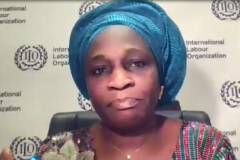TICAD8 Side Event Looks at Ways to Transform and Build Resilient Economies in Africa Following the COVID-19 Pandemic
2022.11.29
On Aug. 23, 2022, the Japan International Cooperation Agency (JICA), the African Union Development Agency-NEPAD (AUDA-NEPAD) and the African Center for Economic Transformation (ACET) co-hosted “Policies for Resilience and Economic Transformation in Africa: Setting the Agenda for a Post-COVID-19 Era,” an online event hosted on the sidelines of the eighth Tokyo International Conference on African Development (TICAD 8). TICAD is a summit-level international conference on Africa's development initiated by Japan. This year’s side event was centered on a joint study by JICA and ACET titled “Transforming and Building Resilient Economies in Africa: Resetting Priorities for the Policy Agenda in the Post-Covid-19 Era.” Ohno Izumi, senior research advisor at JICA Ogata Sadako Research Institute for Peace and Development (JICA Ogata Research Institute), participated as a panelist in Session Two.
The event began with opening remarks by JICA President Tanaka Akihiko, who provided an overview of the recent trajectory of Africa’s economy. He summarized the joint study by JICA and ACET to diagnose the issue of economic transformation in Africa from perspectives including diversification, economic products, economic structure, labor productivity, technological upgrading and human well-being. Citing the case studies conducted for this study in Ghana, Kenya, Mozambique, Rwanda, Tunisia and Zambia, he suggested the need for industrial policy as a concrete means to strengthen resilience of African economies in today's challenging global landscape.

Tanaka Akihiko, president of JICA
Nardos Bekele-Thomas, chief executive officer of AUDA-NEPAD, then gave welcoming remarks, leaving the audience with the question “How do we accelerate economic growth, expand the economy, and in the meantime, increase the number of stakeholders in the economy and create the necessary jobs for much needed economic transformation and a resilient continent?” According to Bekele-Thomas, Africa needs 13 to 15 million jobs a year for the bulging youth population. She also noted that to energize the industrial sector, it will be important to work with the private sector and to find solutions together by rethinking the important pillars of the policy agenda to overcome negative trends.

Nardos Bekele-Thomas, chief executive officer of AUDA-NEPAD
In Session One, Roberto J. Tibana, director of research, ACET, provided the background to the study report “Transforming and Building a Resilient Economy in Africa in the Post-COVID-19 Era: Resetting Priorities for the Policy Agenda” and summarized the findings as follows: Economic transformation is the key to building resilient economies in Africa. To better withstand the negative impacts of external shocks like COVID-19—and to quickly and strongly recover from them—African countries must take steps to prioritize and implement policies that support transformation: to further diversify their economies; be more competitive in the export markets; achieve higher levels of productivity, especially labor; and upgrade technology to improve the production and export of high-value-added goods and services. The report’s specific recommendations for African nations are: 1. Prioritize economic transformation, 2. Have a coherent industrial policy, 3. Coordinate with the private sector, 4. Invest in digital technology and innovation, and 5. Fix the political economy of development.

Roberto J. Tibana, director of research, ACET
Next, famed Columbia University professor Joseph Stiglitz gave his reaction to Tibana’s presentation where he praised the report for emphasizing that sustainable growth requires structural transformation. Additionally, he highlighted some megatrends that have to be taken into account in Africa’s transformation: climate change, demographics, urbanization, a global decline in employment in manufacturing, a “new Cold War,” the end of neoliberalism, and a new emphasis on industrial policy. Given the decline of manufacturing and Africa’s population growth, the continent must focus on the service sector and “employment-generating innovation,” he added. Finally, he gave three pieces of advice to Africa: Be wary of excessive debt, work to revise intellectual property (which impeded Africa’s access to COVID-19 vaccines) and choose democratic development partner countries, which are more “likely to lead to broader-based, more people-oriented development.”

Joseph Stiglitz, professor at Columbia University
Session Two was a panel discussion by Ohno Izumi, senior research advisor at JICA Ogata Research Institute; Martin Bwalya, director of knowledge management and program evaluation at AUDA-NEPAD; and Cynthia Samuel-Olonjuwon, assistant director-general and regional director for Africa at the International Labor Organization (ILO). Stiglitz rounded out the panel.
First, Kinley Salmon, Africa correspondent for The Economist magazine, who served as the moderator of the sessions, asked Bwalya what economic transformation in Africa looks like today, keeping in mind there’s a huge variety of countries with different challenges and strengths on the continent, compared to 10 years ago. Bwalya said diversity is not necessarily a negative, and the capacity to generate sustainable and resilient growth is more important than growth itself. To be able to generate such growth, Africa must build on frameworks such as the African Continental Free Trade Area, take into account the megatrends mentioned by Stiglitz, and reflect on African norms and values. Climate change, COVID-19 and global conflicts are wakeup calls that impact not just growth, but the basic livelihood of Africans, and "that is not acceptable,” he said. Making the best investments in economic infrastructure, education, health, water and energy security will be a critical policy.

Martin Bwalya, director of knowledge management and program evaluation at AUDA-NEPAD
The moderator then asked Ohno how Africa can grow labor market productivity and absorb the young population into the labor market amid the premature deindustrialization mentioned by Stiglitz. Ohno maintained that despite Stiglitz’s comments, it is still important for Africa to industrialize, though she defined industrialization broadly as including digitalization, ICT, green industry and agro-industry. She said that while in many parts of the world, there is a shift to enhanced, more knowledge-intensive, high-productivity service sectors, that is not yet happening in Africa. Hence, there is a need for a continued focus on manufacturing. She said agriculture should be made more productive through commercialization and the use of digital technology, and service sector productivity should be improved, because most of the sector’s growth is in the informal trade sector. “The scope of industrialization is broadening with technological advance and increased SDG [Sustainable Development Goals] concern which takes account of climate change response, social consideration, and social problem-solving types of businesses—not limited to stereotypical parts and components industry. So, I think there are emerging opportunities to be tackled. But this doesn't mean manufacturing should be disregarded,” she said.

Ohno Izumi, senior research advisor at JICA Ogata Research Institute
The focus then shifted to Samuel-Olonjuwon, who was asked for ideas on how to create enough good jobs for Africa’s young population. “The regional integration agenda is a very important opportunity for Africa in terms of transformation, but also in terms of creating decent jobs for its youth,” she said. Regarding policy, she recommended that national development plans back up with action their talk of creating high-quality jobs for young adults, and that governments take a whole-of-government approach to this job creation. She also emphasized the importance of labor market governance. She said there is a need for coherence among development partners. And she said young people must be brought to the table when policies are formed that affect them.

Cynthia Samuel-Olonjuwon, assistant director-general and regional director for Africa at the ILO
Next, Salmon asked for a reaction from Stiglitz, based on Ohno’s comments, saying “Should we still have more faith in manufacturing as a source of jobs, or is it all about services now?” “It’s not that manufacturing is dead. It’s that we can’t rely on it to get the jobs for the growth in population. So, I agree that there is room to expand manufacturing in Africa, and that expansion in manufacturing can play an important role not only in creating good wages, good jobs, but also in transferring broader technology,” Stiglitz said. However, he said, “services and agriculture are going to be important, inevitably, and therefore, strategies ought to be focused on increasing productivity in those sectors.”
Salmon posed the following question to Ohno: “What is the role for outsiders such as development partners and international partners?” Ohno responded development partners can 1. Share knowledge on concrete development experiences, 2. Advise and provide hands-on policy support to committed leaders on designing and implementing transformation plans, 3. Help core institutions in charge of industrial development or agricultural transformation improve their capacities, and 4. For think tanks like ACET, organize knowledge forums to create coalitions among transformation leaders for mutual learning and stimulation.
Further questions and answers followed, and a lively discussion ensued.

事業事前評価表(地球規模課題対応国際科学技術協力(SATREPS)).国際協力機構 地球環境部 . 防災第一チーム. 1.案件名.国 名: フィリピン共和国.

事業事前評価表(地球規模課題対応国際科学技術協力(SATREPS)).国際協力機構 地球環境部 . 防災第一チーム. 1.案件名.国 名: フィリピン共和国.

事業事前評価表(地球規模課題対応国際科学技術協力(SATREPS)).国際協力機構 地球環境部 . 防災第一チーム. 1.案件名.国 名: フィリピン共和国.

事業事前評価表(地球規模課題対応国際科学技術協力(SATREPS)).国際協力機構 地球環境部 . 防災第一チーム. 1.案件名.国 名: フィリピン共和国.

事業事前評価表(地球規模課題対応国際科学技術協力(SATREPS)).国際協力機構 地球環境部 . 防災第一チーム. 1.案件名.国 名: フィリピン共和国.
scroll